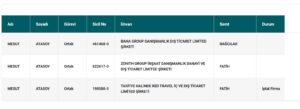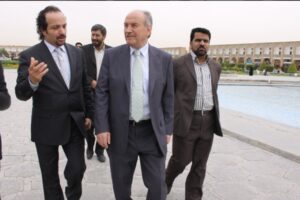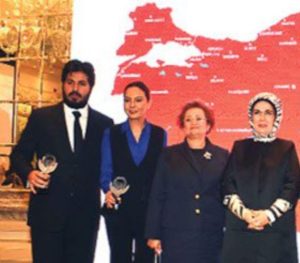Abdullah Bozkurt/Stockholm
An Iranian operative accused of transporting prohibited materials for Iran’s nuclear enrichment program remains active in Turkey after avoiding criminal charges with the assistance of President Recep Tayyip Erdogan’s pro-Iran government.
Maghsoud Ghaffariyeh, who adopted the Turkish name Mesut Atasoy after acquiring Turkish citizenship in December 2010, continues to operate despite facing serious charges of transporting prohibited materials for Iran’s nuclear program, in violation of Turkish laws.
According to trade registry records, two out of three companies operated by Ghaffariyeh are still listed as active enterprises in Turkey. One of these companies, Baha Group Danişmanlik Diş Ticaret Limited Şirketi (Baha), a foreign trade and consulting firm based in Istanbul, was implicated in 2012 following an investigation by German federal prosecutors into Ghaffariyeh’s associate Hossein Tanideh. Tanideh, an Iranian, was sanctioned by the US Treasury Department in 2012.
The German investigation revealed that Iranian front companies based in Istanbul transported 941 items with nuclear applications through Turkey, with the end user being Iran’s Modern Industries Technique Company (Mitec).
Mitec is subject to UN, US, and EU sanctions for procuring materials used in the heavy water reactor in Iranian city of Arak. It is owned or controlled by the Atomic Energy Organisation of Iran (AEOI).
Tipped off by their German counterparts, Turkish police detained both Tanideh and Ghaffariyeh in January 2013, executing search and seizure warrants at their residences and affiliated companies. The Turkish investigation corroborated German suspicions, revealing that the two had sent materials with nuclear applications obtained from Germany and India to Mitec, falsely declaring them as plumbing parts and fixtures.
Turkish police discovered that 91 items with nuclear applications were sent from Germany to Iran via Turkey on seven occasions, while 856 nuclear items were sent four times from India to Iran via Turkey.
Fearing arrest in Germany, Tanideh fled Turkey in June 2012 and kept a low profile to avoid detection. He was sheltered in one of the properties owned by Ghaffariyeh.
According to official records, Baha was founded in August 2001 by Ghaffariyeh and another Iranian named Ebrahim Jafarimotlagh. In March 2003 Ghaffariyeh brought his relative Mohammad Reza Ghaffariyeh on board as a partner in the firm. Ghaffariyeh either owns or rents 12 properties in Istanbul alone. Baha’s most recent office address is My Office 212, a prestigious commercial property near Atatürk Airport in Istanbul.

Another business owned by Ghaffariyeh is the Zenith Group İnşaat Danışmanlık Sanayi Ve Dış Ticaret Limited Şirketi, which operates in the foreign trade and construction sectors. He established the company in June 2012 with Gulnara Nerziyeva, a Turkmenistan national. Ghaffariyeh became the sole owner after Nerziyeva departed and sold her shares to him. The company remains active and is listed in the trade registry.
In July 2019 Ghaffariyeh, along with two other Iranian nationals, Bayanollah Ramezani and Masoud Karimkhani, established a trading company named Red Travel İç ve Dış Ticaret Limited Şirketi. The company was dissolved in May 2022. Its swift liquidation suggests that it was set up as a shell company for a specific purpose and subsequently abandoned once that objective was achieved.
Although both Tanideh and Ghaffariyeh were under criminal investigation in Turkey by the anti-smuggling and organized crime unit at the Istanbul Police Department, they were released from detention and the investigation was dropped following interference by the Erdogan government. Turkey also rejected Germany’s extradition request for Tanideh, who subsequently returned to Iran. Ghaffariyeh remained in Turkey and has continued to operate his business ventures without facing any legal consequences.
Their case coincided with two significant investigations into Iran’s clandestine activities in Turkey, which targeted Iranian smugglers, spies and terrorist networks. However, both investigations were suppressed by the Erdogan government, which openly intervened in the cases.

The Erdogan government, influenced by numerous pro-Iranian Islamists in key positions, has tolerated covert Iranian activities disguised as legitimate business ventures. In some cases it has actively facilitated these activities, motivated by substantial financial gain that has enriched those involved, including members of Erdogan’s own family, to the tune of millions of dollars.
In February 2014 the Erdogan government disrupted Turkey’s most extensive counterterrorism investigation into the Islamic Revolutionary Guard Corps (IRGC) Quds Force network. This investigation, conducted between 2011 and 2014, had incriminated senior government officials who were accused of assisting Iran’s covert operations.
A pivotal moment highlighting this collusion emerged in December 2013 when Erdogan, then prime minister, and several members of his cabinet were implicated in extensive corruption investigations. These probes uncovered their roles in laundering Iranian state funds through the Turkish banking and financial systems, exposing a network of illicit financial activities with broad implications.
The probe revealed a convoluted network of corruption, with Turkish-Iranian national Reza Zarrab at its core. Zarrab bribed senior government officials, including cabinet ministers, and developed personal relationships with Erdogan and his wife, Emine.
Trade registry document that shows the establishment of Baha in Turkey by Iranian national Maghsoud Ghaffariyeh and his associate:
Following his implication in the probe, Erdogan intervened to derail the prosecution by orchestrating the removal of lead prosecutors and investigators involved in the case. All the suspects, including Zarrab, were subsequently released with the assistance of judges newly appointed by the Erdogan government to oversee the proceedings.
The saga took a dramatic turn when Zarrab was arrested by the FBI in Miami in 2016. He faced charges filed by the US Attorney for the Southern District of New York, accusing him of orchestrating transactions worth hundreds of millions of dollars on behalf of the Iranian government. Additionally, he was charged with money laundering and bank fraud.
Zarrab struck a plea deal with prosecutors and cooperated in a landmark US federal case, providing insight into President Erdogan’s involvement. According to Zarrab’s testimony, Erdogan instructed Turkish state banks to participate in the multibillion-dollar scheme in exchange for kickbacks.
Iranians have increasingly become leaders in establishing foreign-owned businesses in Turkey, despite the modest trade volume between the two countries. Many of these enterprises, managed by Iranians, are involved in acquiring banned or restricted materials for Iran. They also facilitate the distribution of funds and provide logistical support for Iran-aligned terrorist entities and proxy factions on a global scale.
The Erdogan government openly declared its refusal to participate in Western sanctions on Iran, declined to extradite suspects wanted in the US and Europe on criminal charges and provided economic and trade concessions to support the Iranian regime.













